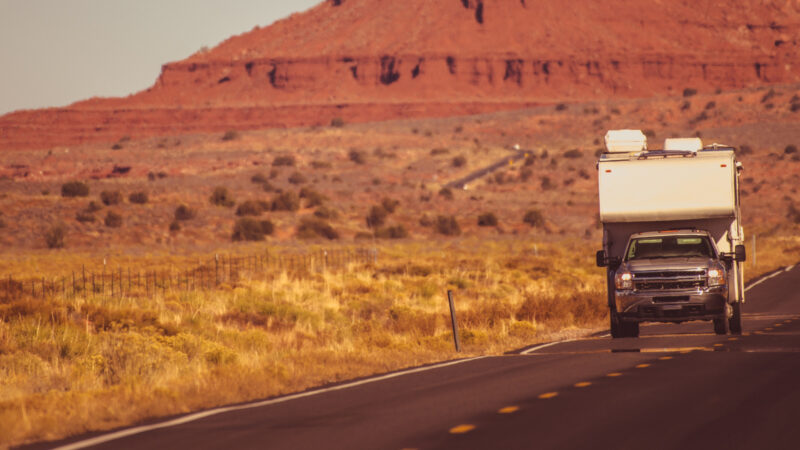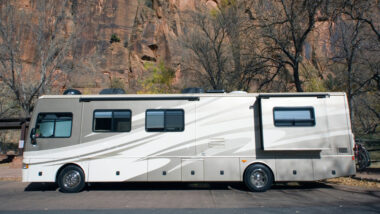Table of Contents Show
We recently downsized from a fifth-wheel to a truck camper. It didn’t take long to discover that truck camping differs from traveling in our massive rig. However, we’ve learned to go with the flow and learned quite a bit during the process.
Today’s article is for you if you’re a newbie or considering this camping style. We’ll share some of the best truck camping tips we’ve learned.
So buckle up, and let’s get started!
What Is Truck Camping?
Truck camping is when your truck is more than a means of transportation to your adventure. In these situations, the truck also serves as your home away from home.
It requires you to modify the bed or install a camper shell, truck cap, or a camper to create a comfortable living space. Though small, it can be as comfortable as any other method.
Many travelers embrace truck camping because of its flexibility for exploring. Depending on the capabilities of your vehicle, you can reach some epic locations. Moving from one place to the next is much easier for us. Compared to our fifth wheel, we enjoy going farther and faster on long travel days.
Is Truck Camping Legal?
Truck camping is no different than camping in any other type of recreational vehicle. As a result, the United States has no specific laws prohibiting truck camping. However, just like other campers, you will have rules and regulations banning where you can camp.
Unfortunately, these policies vary from one location to the next. You must check the laws specific to where you plan to camp. Urban and more populated areas are stricter than rural locations. Luckily, plenty of businesses and public lands allow you to set up camp legally.
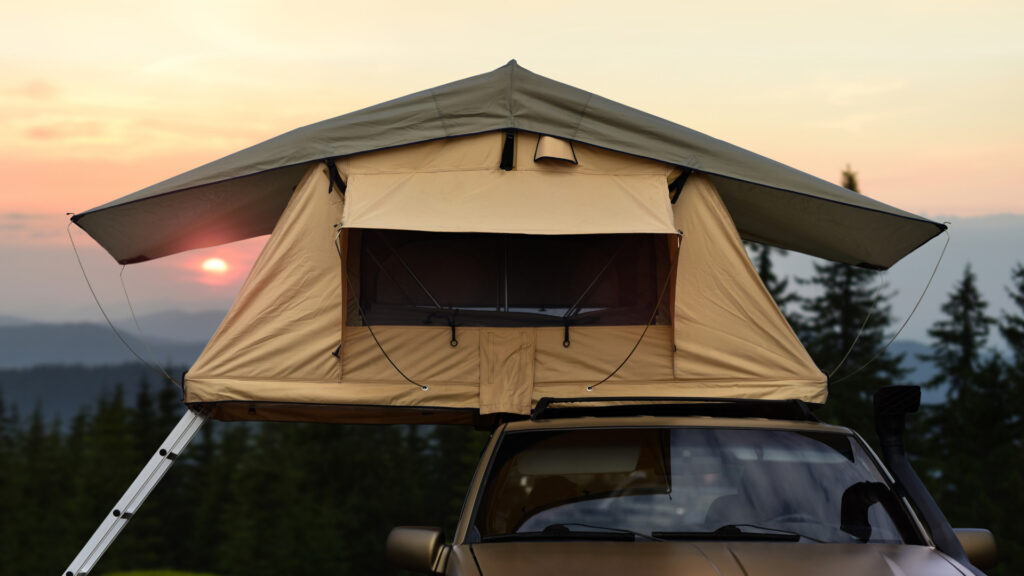
10 Truck Camping Tips for Newbies
While much of our prior RVing experience has helped us, we’ve learned a lot from truck camping. Here are 10 of our best truck camping tips for newbies.
Plan Your Route and Destination
One of the first things we’ve learned while traveling is to do plenty of planning. Doing some research can help you avoid sticky situations.
While our truck camper is much smaller than our fifth wheel, we still need to avoid many roads. Avoid low clearances and narrow streets as much as possible.
We use RV Life Trip Wizard to help us stay organized. This allows us to plan our destinations and the exciting stops along the way. We can also use the program to estimate when we’ll need to stop for fuel along the way. Having all of our travel logistics in one location has been incredibly useful.
Always Have a Plan B (and C)
Things don’t always go as planned when truck camping. Campgrounds may be full, traffic won’t cooperate, and other issues can throw a wrench in your plan. As a result, it’s a good idea to have a Plan B in place from the start. Unfortunately, having a Plan C in some situations doesn’t hurt.
Part of doing the planning and research ahead of time is to have options. The more options you have, the better. Without multiple possibilities, it could cause you to panic or experience anxiety. This can start a snowball effect that leads to one wrong decision after another.
Make a Checklist
We quickly realized the importance of having checklists while RVing. We love checklists so much that we have a section on our website dedicated to them. If we’re being honest, these lists have saved us more times than we’d care to admit.
Truck camping requires us to do certain tasks in a specific order. Skipping steps or doing things out of order can have disastrous consequences. The risks don’t necessarily go away with more experience.
The longer you do something, the more likely you are to gain a sense of confidence. Having too much confidence can result in mistakes. Sadly, these can be costly and dangerous, so you’ll want to minimize them.
Pack Light
Truck camping is an excellent option if you want to embrace minimalism. Because of the limited space, you have no choice but to pack lightly. If not, your living space will get used for storing gear and equipment. You will need more room to spread out.
Packing light will require you to evaluate the items you bring along for the journey. The reality is items you’d like to bring will have to stay behind. If you won’t use something, leave it at home. When choosing equipment, always consider if it’s worth the weight or use of storage space.
Invest in Good Sleeping Gear
After a long day of adventuring, there’s nothing better than a comfortable resting place. If you’re modifying your truck bed, investing your time, energy, and money into your sleeping space is a good idea. If not, you could end up tossing and turning night after night.
Even if you buy a new truck camper, there’s a good chance the mattress will disappoint you. Manufacturers notoriously choose beds worse than a two-star hotel. One of the first upgrades many owners make is to upgrade their mattresses.
It’s also important to consider your bedding. When making your choice, consider the climate. You’ll want to stay comfortable no matter the weather. The fabrics you choose can help in cold and warm weather locations when truck camping.
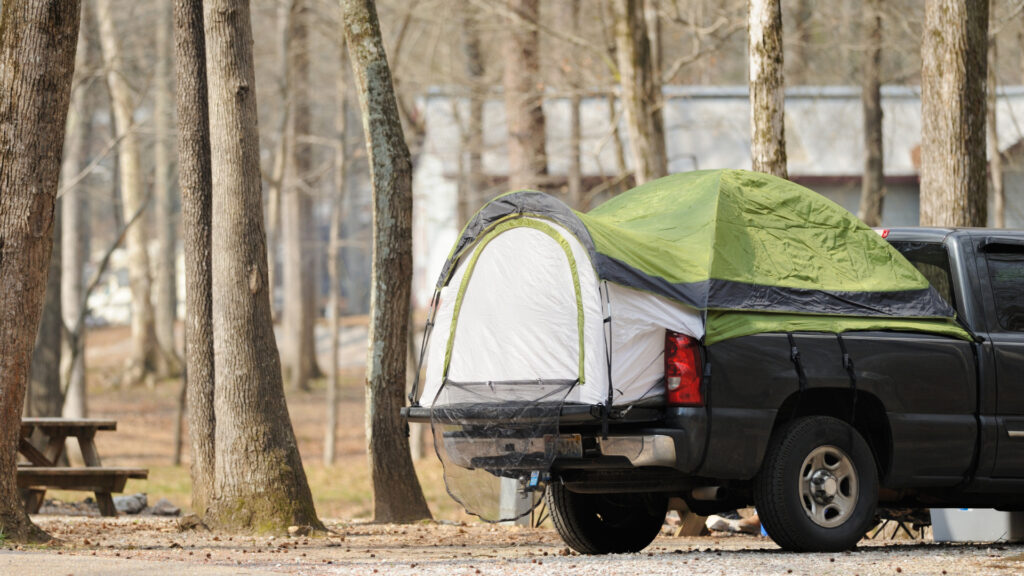
Bring a Portable Stove and Cookware
You will need to eat no matter where you camp. Bringing a portable stove and some cookware can allow you to make delicious foods from just about anywhere. This can help you avoid expensive restaurants and save money for future adventures or truck camper upgrades.
Even if your camper has a kitchen or cooking area, a portable stove lets you prepare meals outside. This can be extremely helpful, especially during the summer when the inside of your rig may already feel toasty.
It can require some getting used to, but it’s worth it. Once you have several trips, you’ll practically be an expert. You may have to adjust some recipes, but there’s no limit to what you can prepare.
Properly Organize Your Stuff
Once you’ve narrowed down your gear, organize it properly. Keep items you’ll frequently use easily accessible. In addition, you can put those rarely used items towards the back of storage spaces.
How you organize your stuff in your truck camper can significantly impact your experience. When you need to use something, you must know where it is. Unfortunately, this can take time. You may think you’ll always use some items, but they rarely or never get used.
Keep in Mind: So should you consider buying a camper shell? Click to see everything you need to know about camper shells!
Respect the Environment
Always follow Leave No Trace practices no matter where you camp. Unfortunately, this isn’t just a tip for newbies; it’s a reminder to everyone.
We’ve seen some experienced campers disrespecting the environment. This is one of the biggest reasons some camping areas experience restrictions.
You can do this by camping in approved places, staying on marked trails, and avoiding leaving anything behind. Make it your goal always to leave a campsite cleaner than you found it. This means picking up your trash and any left behind by others. We are all responsible for protecting the environment.
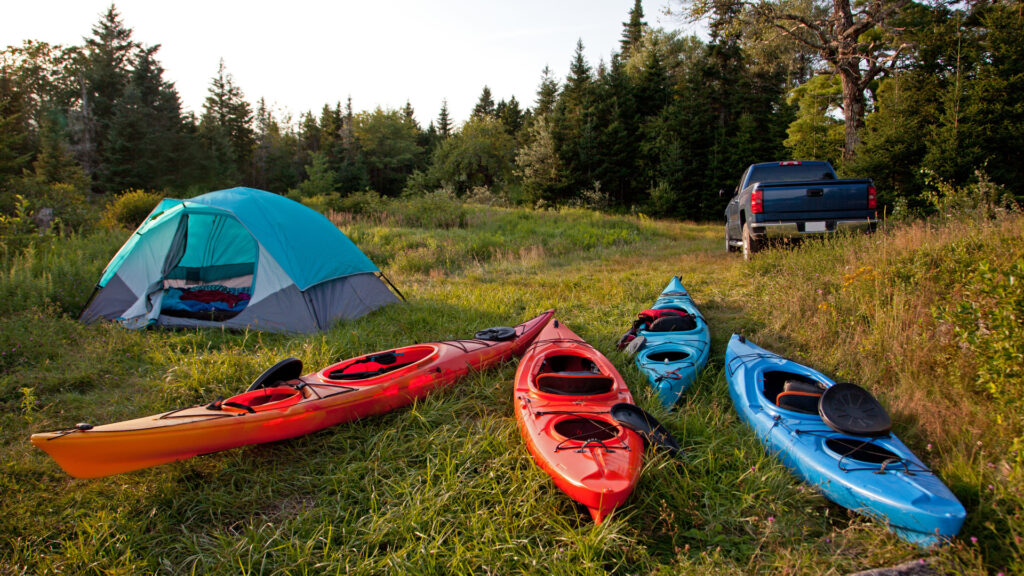
Consider Portable Power Sources
Our favorite thing about truck camping is the freedom it provides.
However, if you don’t have a portable power solution, your ability to enjoy those freedoms will be severely limited. Generators, solar panels, and battery banks can all be valuable ways to power a truck camper.
Investing in solar panels and lithium batteries can be incredibly expensive. However, many find that they can pay for themselves over time by allowing you to avoid costly reservation fees. Because of them, you can enjoy privacy and the great outdoors while having many luxuries.
Pro Tip: If you enjoy boondocking, you’ll want to consider solar panels. See how to know how many solar panels you need for an RV.
Have Fun and Be Flexible
We’re not going to lie; truck camping can be a stressful experience. However, when things don’t go as planned, you must remember your purpose.
When creating your itinerary, build in time for fun, whether hiking, sitting on the beach, or going on a scenic drive. If you’re not having fun, you’re doing it wrong.
It’s also important to be flexible. These types of experiences rarely go 100% as planned. As a result, it’ll require you to develop your skills of going with the flow. How you respond during these circumstances can make or break the experience for others in your group.
You Can Be a Truck Camping Expert
The key to becoming a truck camping expert is to get out and start doing it.
Start with overnight or shorter trips as you grow your skills. Once you’ve gained some confidence and honed your skills, you can extend the length of your trips.
However, be careful; it can be addictive. You may find yourself toying with the idea of traveling full-time.




